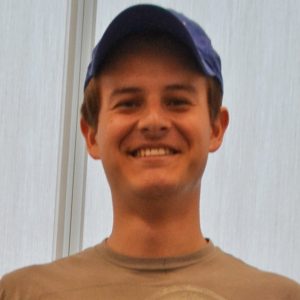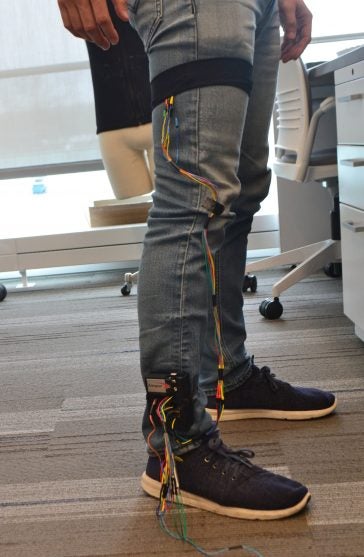
By Neil Nachbar
While pursuing his bachelor’s degree in biomedical engineering from Universidad Iberoamericana in Mexico City, José Miguel Cantón Leal was seeking a hands-on internship, which was one of the requirements to complete his degree.
That’s when he discovered an article on Google Scholar written by Kunal Mankodiya, URI associate professor of biomedical engineering.
“The article was related to prosthetics, which was exactly what I wanted my bachelor’s to focus on,” said Cantón Leal. “I emailed Kunal explaining what I was looking for and asked if he had any projects I could be involved in.”

Mankodiya offered a project in which Cantón Leal would work on a sensory-feedback system for a leg prosthesis.
Cantón Leal started the project by determining which pressure sensors to use, by testing their linearity and invariability. He then developed codes for controlling vibration-motors with the pressure applied to the sensors.
To validate the project, Cantón Leal created a series of tests to determine if participants could actually feel different vibrations at the same time, different vibration amplitudes, and if they could interpret what those vibrations mean.
For the final test, participants would walk on an uneven surface with and without the system, so they could feel the difference and then answer a survey to evaluate the system’s performance.
Prior being sent home in March due to the coronavirus pandemic, Cantón Leal completed his project. In the future, the technology he worked on will be tested on lower-limb users and healthy participants.
“As soon as things are normal again, I will present my project to the biomedical engineering board at my university and then I’ll receive my bachelor’s degree in biomedical engineering,” said the 25-year-old.
Cantón Leal is grateful for the experience and support he received at URI.
“Working in the Wearable Biosensing Lab with Kunal was an amazing experience,” said Cantón Leal. “Kunal is such an inspiring and motivating professor and URI is a great university, with a high level of academics and fantastic lab facilities.”
Mankodiya was impressed with the research Cantón Leal conducted in his eight months at URI.
“You can see the passion and precision in José’s work,” said Mankodiya. “We wish him the best and I hope we can find an opportunity to work together again.”
